|
Demand for a quota for women increases as
Parliamentary elections draw close:
Unequal and unfair
by Dhaneshi Yatawara
Though there is verbalised appreciation for women in politics, among
politicians and political parties alike during election campaigns, often
it is a ploy to gain only women's support and hardly translate into
supporting women as candidates.
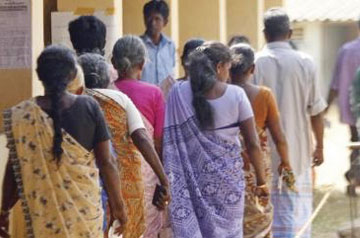 |
| Women at a
polling station |
Sri Lanka produced the first woman to head a Government in the modern
world by electing Sirimavo Bandaranaike as the Prime Minister in 1960.
Yet, the country is still far below even Rwanda where 64 percent of its
Parliament is represented by women MPs.
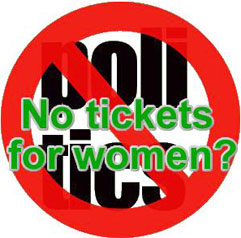 And Rwanda is not alone. Senegal, Seychelles and South Africa have
the highest number of women in their Parliaments, according to an
Inter-Parliamentary Union (IPU) assessment in February 2015. And Rwanda is not alone. Senegal, Seychelles and South Africa have
the highest number of women in their Parliaments, according to an
Inter-Parliamentary Union (IPU) assessment in February 2015.
Worldwide, only one out of five parliamentarians are women. The
difference with the countries with higher female political
representation in Parliament does not necessarily show they are equal
societies due to the presence of the special quota system, according to
the IPU assessment. In Ruwanda, 30 percent of all candidates standing
for various elections must be women, while in Senegal, it is 50% since
2012.
Sri Lanka is still struggling to mainstream the idea of 25 percent
reservation for women candidates with little success so far.
There had been lobbying going on for over two decades with more
consistency and strength recently, but the country's political parties
have so far failed to adopt the system, a tool used in India for
empowering women in the political decision-making process.
Severe disparity
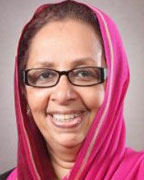 |
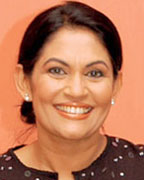 |
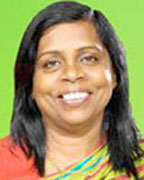 |
| Ferial Ashraff |
Rosy Senanayake |
Anoma Gamage |
The election manifesto of the current government pledge to achieve
this target. Women politicians say, this target is for the local level
elections where women's representation is crucial. Women politicians, be
they in Parliament or Provincial Councils, it was a new political
culture that was expected with the new government.
"We, as the Women Parliamentarians' Caucus are giving our fullest
effort to take steps to ensure a 25 percent women representation in
Parliament and the Provincial Council level," said Minister Child
Affairs , Rosy Senanayake.
Entering politics on her own, Senanayake held her position with the
United National Party (UNP) as a woman who created her own political
career through hard work. The Women Parliamentarians' Caucus, with the
establishment of the new Government, have had discussions with Prime
Minister Ranil Wickremesinghe followed by discussions with the
Commissioner of Elections, to facilitate the inclusion of a reservation
for women candidates.
Minister Senanayake made these remarks at a recently held conference
themed 'Celebrating women: Towards an inclusive political culture',
organized jointly by the International Alert and the South Asia Policy
and Research Institute (SAPRI).
"Women activists have been tirelessly working over this issue for
years. I am very proud that we have very strong women in advocating this
concept to ensure better inclusion of women at decision- making level,
also within the political parties, including the UNP," she added.
Senanayake pointed out that Sri Lanka should not stop by achieving a
25% quota, but should try to make sure that it can be increased up to
50%. Highlighting the effective and positive aspects a women political
majority could bring, Senanayake said, many public issues discussed that
need political interventions would have more perspectives and an
inclusive approach if women were accommodated at the political
decision-making level.
Her argument was that their male counterparts tend to overlook at
common issues like undernourishment, domestic violence and parallel
social issues but with more women power in politics that could change.
"It is a better tomorrow for the country and the youth that we are
expecting with these efforts," she said.
Despite these efforts, the present election reforms the Cabinet of
Ministers approved last week, unfortunately, does not reflect the
acceptance of better representation for women.
Key recommendations
The Young Political Leader's Forum of Sri Lanka (YPLFSL) released a
working document with key recommendations and Multi Year Action Plan to
increase women's representation in political institutions. Among the key
recommendations the YPLFSL highlights the importance of making the
current discretionary quota for women and youth mandatory. Member of
Parliament, representing the Young Political Leader's Forum of Sri Lanka
(YPLF-SL) Hunais Farook said that increasing women representation in
politics is a step towards creating a vibrant democracy.
He said that working jointly with the Women Parliamentarian Caucus of
Sri Lanka the YPLF is stressing the importance of implementing the
recommendations in political institutions at different levels.
Following several workshops and discussions with women activists,
politicians, the YPLF documented the list of recommendations."Women
activists are clamouring for a 33 percent women representation. We will
begin discussions within our parties on the possibility of converting
this to a mandatory quota," Farook said.
Research on nominations for women reveal that there is a major gap
between the public statements of the major political parties in
particular the United National Party and the Sri Lanka Freedom Party
about increasing nominations for women and the number of actual
nominations given to women during elections, as stated in the YPLF
working document.
As young parliamentarians we commit to explore ways and means by
which the internal party quota can be adopted at least in our own
constituencies at local level politics whereby more nominations can be
given to women, Farook said.
One major issue regarding many Sri Lanka women politicians is their
mode of entry in to politics. As observed in most cases they enter
following the death of the father, brother or husband. A very few have
entered by themselves.
Senior politician Ferial Ashraff and Deputy Minister of Irrigation
and Agriculture Anoma Gamage were of the view that it is unfair to point
out only the plight of to women politicians.
The issue was taken up at a round table discussion held jointly by
the International Alert and SAPRI to issue the YPLF Working Document and
the Multi Year Action Plan.
"The family background to a certain extent helps women to enter
politics and be good politicians But that alone is not sufficient," said
Ashraff.
The need of women at decision making level has not been made clear to
the politically active women leaders working at ground level , she
explained. We encourage people to enter politics but we should give a
clear view of what it is all about, she added.
Commenting on the part played by activists who are trying to promote
women political representation Ashraff stressed that it is high time
they promote women at village level because men do not want women to
fight for their rights. |

